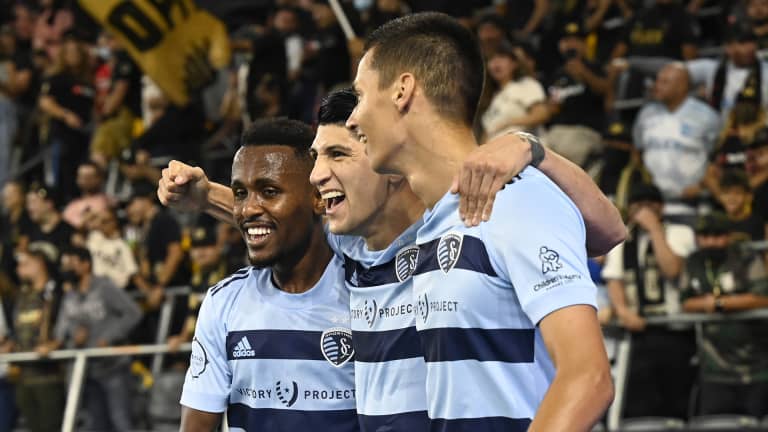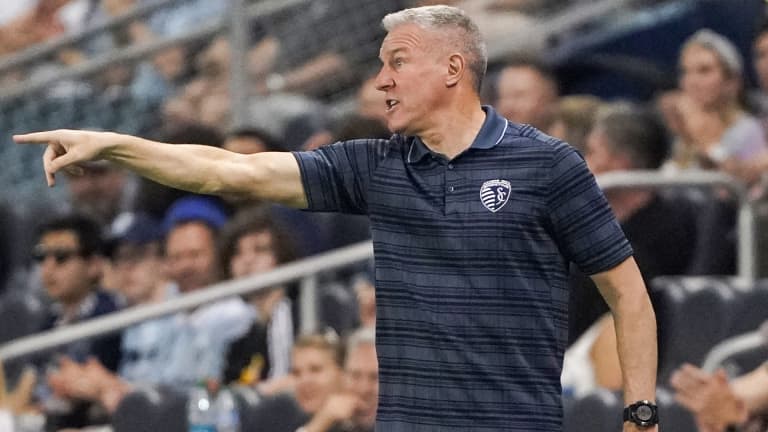Sporting Kansas City are making history in 2022.
The wrong kind of history.
“Never in the history of the DP era have two DPs not played a single game in a season,” longtime manager Peter Vermes told MLSsoccer.com in a one-on-one conversation ahead of Sunday’s nationally-televised visit from the New England Revolution (3 pm ET | ABC, ESPN Deportes).
That would be Designated Players Alan Pulido and Gadi Kinda, the two most expensive signings in club history and the heart of Vermes’ 2022 attack – or at least, that was the plan, before they were diagnosed with knee problems that would require season-ending surgery.
The Pulido news was particularly devastating, given that the Mexican international is SKC’s club-record transfer capture from Liga MX’s Chivas, reportedly costing nearly $10 million, intended as the capstone of a title contender – only for injuries and national-team call-ups to limit his availability to a fraction of the matches in his first three seasons.
“Alan Pulido gets hurt with the national team, I have no control over that,” said Vermes. “Even all last year he was, how do I put this? He was maybe 50% of himself. And so nobody was clear yet on what kind of surgery or if he had to have surgery, or what would fix what, just nothing like that. It really wasn't found out until after the end of the season. And so he played the whole entire season with this problem.”
Toss in a bevy of other injuries and some ill-timed international call-up absences, then sprinkle on a difficult generational shift unfolding across the roster. There you have the recipe for one of the worst starts in SKC’s modern era, a 3W-8L-4D record across their first 15 league matches that’s dropped them into last place in the Western Conference standings and presented Vermes with the most difficult challenge of his 14-year managerial tenure.
“I’m getting a chance to experience something I've never experienced before in my career, and in the rest of the staff’s. It's incredibly challenging,” said the 2013 MLS Cup winner. “It's forcing us to have to come up with solutions that I don't think that I would ever have faced.
“We're trying to deal with it head-on, and I think at some times we've done a really good job and other times, we just have to do what we can based on what we have available to us.”

Depth chart tested
It’s not just the DP duo. At various times injuries have also robbed the Midwesterners of the likes of fullback Graham Zusi, captain and winger Johnny Russell, center back Nicolas Isimat-Mirin, homegrown attacker Ozzie Cisneros, Pulido’s backup Khiry Shelton and Nikola Vujnovic, the Montenegrin spearhead brought in on loan in the wake of Pulido’s loss for the season, for long stretches.
Daniel Salloi and promising young newcomer Marinos Tzionis are currently away on international duty with Hungary and Cyprus, respectively, and likely will be again in the coming months and years. All of it has forced a number of reserves and youngsters into bigger roles than planned, with all the growing pains that suggests.
“It puts a lot more pressure on guys that, you didn't necessarily expect to have to put them under that kind of pressure for the entire season,” explained Vermes. “They could be a guy that is a spot guy, plays maybe somewhere between five and eight games over the course of a season, not 30 games. They're just not built that way. But you have to adapt and adjust and you have to find a way.
“I'm a big believer that it's best to try to put a lot of people into positions where they can be successful as opposed to the opposite, because that's a big setback,” he added. “Confidence-wise and especially in sports, sports are all about confidence. So now all of a sudden you put the guy out there and it doesn’t go well, and now all the work that you've built up over the last couple of months just dissipates in one 90-minute game.”
Sporting’s press-and-possess system traditionally hinges on goal-dangerous wingers like Russell and Salloi, and when it’s clicking, it can be devastating. But having to reach deep down the depth chart has tested its viability.
“The pressure starts to mount and you're again patching players in different positions that, that's not even their position within the team,” said Vermes. “And so you're expecting them to now take on, ‘hey, go out and score two, three goals like Daniel Salloi can do’ – it's not happening.”
A seven-game winless skid across April and May, highlighted by a painful 7-2 away thumping at the hands of the Portland Timbers, provided a sobering reality check for an organization and fanbase accustomed to consistent competitiveness at the top end of MLS. While a couple of decent results against Colorado and San Jose helped staunch the bleeding, SKC’s body of work before the international break was uncharacteristic and now they must find a way to make Children’s Mercy Park an unpleasant destination for the Revs this weekend.
Vermes has preferred a classic 4-3-3 formation for most of his decade-plus in charge and prefers to keep continuity across his lineups. This year’s extreme circumstances have forced him to experiment, even as his players have – understandably – shown signs of greater comfort in the setup they grew to be hard-wired in over the years.
“If you have Alan Pulido and then you have Khiry Shelton as a backup, and then you have Nikola Vujnovic, who you bring in as a loan guy to be in that position, and all three of them are injured, well, now I'm a false 9 at best, right?” said the manager. “So it really changes the complexity of things. And that's exactly where we are.”
Generational shift
Then there’s the matter of the wider generational shift in Kansas City. The core of the squad that won an MLS Cup, thrived in the Open Cup and even made noise in Concacaf Champions League has aged. According to Transfermarkt, Sporting have fielded seven of the 10 oldest starting lineups in MLS so far this season, and mobility has been an issue in key areas of the pitch.
A carefully-built long-term academy-driven player development project has drawn plaudits, but isn’t yet producing reliable contributors on the scale of comparable counterparts like FC Dallas and the Philadelphia Union. As aggressively as SKC have scouted both regionally and nationally, turning up talents like USMNT midfielder Gianluca Busio (sold last summer to Italy’s Venezia) and now-Charlotte FC fullback Jaylin Lindsey, their homegrown pipeline still hasn’t reached the desired level of consistency, and Vermes cites the realities imposed by MLS’s system of homegrown catchment territories.
“No. No, I don't,” Vermes said when asked if he believes that undertaking is on track. “Infrastructure, staff and all the things that go around it are great. Where the difference is, is that we just don't have a fertile [homegrown] territory. And so the fact that we're really landlocked by first, our territory, and then we're unable to go into the most fertile territories, which are the East and West coasts, pretty much. It doesn't allow us to get to a larger pool of players.
“I'm a big believer that it needs to change. If it was up to me, I would say just open up the territories completely, and let everybody fend for themselves, like most everybody does around the rest of the world.”
It’s an idea shared by several other development-centered clubs. Despite sustained difficulties in reaching wider agreement on adjustments to the regulations, Vermes remains hopeful of change.
“It's probably half the teams in the league would say, ‘hey, let's open everything up.’ And another half would say, ‘I don't want anybody to come into my area, because I got all these kids now,’” he said.
“There's a plethora of kids in those East and West coasts,” contended Vermes. “There's more than enough for everybody to participate. And I think the objective is [to] get the best kids in MLS academies, and let's go from there. And I am here to say that I don't necessarily think that we're doing that all over the place.”

Not bowing out
Despite the stiff headwinds Sporting are currently battling, the club’s leaders aren’t ready to write off 2022 just yet (19 regular-season games remain).
The stability of Vermes’ model has allowed SKC to grow more ambitious in the transfer market over the years, and while he declined to delve into details about their plans for the MLS Secondary Transfer Window (runs July 7 to Aug. 4), he is hopeful of swinging some new acquisitions soon. Their hunt for a fifth Open Cup trophy is very much alive; they’ll host USL League One upstarts Union Omaha in an intriguing quarterfinal showdown on June 22.
If he and his staff can keep producing resourceful adaptations and sustain Sporting’s traditional fighting spirit, they believe they can hang around and find form when the Audi MLS Cup Playoffs chase crystallizes in a few months. SKC have made the postseason all but one year from 2011-21.
“I'm not going to drop the standard lower than what we always expect,” said Vermes. “Our objective is to try to make the playoffs every year and then compete for trophies. We're trying to do that in the Open Cup. We're trying, we're inching along here, but we want to make the playoffs, and then put ourselves in a position where hey, maybe we get some more guys healthy. Maybe we’re able to make some acquisitions here in the summertime that then can spend a couple months trying to get adapted and acclimated to our team.
“And then maybe we can make a push at the end, and who knows, maybe be a team that comes on fire at the end.”












